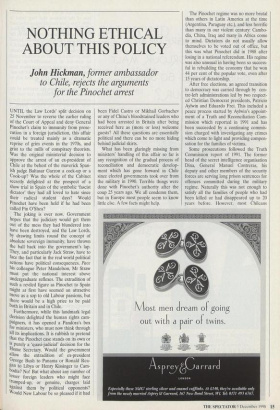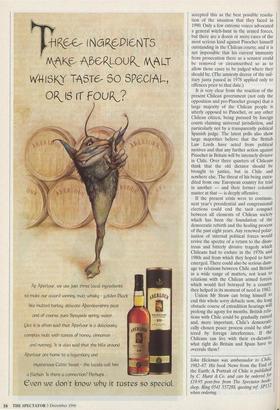NOTHING ETHICAL ABOUT THIS POLICY
John Hickman, former ambassador to Chile, rejects the arguments for the Pinochet arrest UNTIL the Law Lords' split decision on 25 November to reverse the earlier ruling of the Court of Appeal and deny General Pinochet's claim to immunity from prose- cution in a foreign jurisdiction, this affair could be treated mainly as a dramatic reprise of grim events in the 1970s, and grist to the mills of conspiracy theorists. Was the original ministerial decision to approve the arrest of an ex-president of Chile at the behest of the maverick Span- ish judge Baltasar Garzon a cock-up or a Cook-up? Was the whole of the Cabinet secretly delighted at the prospect of a show trial in Spain of the symbolic 'fascist dictator' they had all loved to hate since their radical student days? Would Pinochet have been held if he had been called Pin O'Shea?
The joking is over now. Government hopes that the judiciary would get them out of the mess they had blundered into have been destroyed, and the Law Lords, by drawing limits round the concept of absolute sovereign immunity, have thrown the ball back into the government's lap. They, and particularly Jack Straw, have to face the fact that in the real world political actions have political consequences. Pace his colleague Peter Mandelson, Mr Straw must put the national interest above undergraduate reflexes. The extradition of such a reviled figure as Pinochet to Spain might at first have seemed an attractive Move as a sop to old Labour passions, but there would be a high price to be paid both in Britain and in Chile.
Furthermore, while this landmark legal decision delighted the human rights cam- paigners, it has opened a Pandora's box for ministers, who must now think through all its implications. It is rubbish to pretend that the Pinochet case stands on its own or Is Purely a 'quasi-judicial' decision for the Home Secretary. Would the government allow the extradition of ex-president George Bush to Panama or Ronald Rea- gan to Libya or Henry Kissinger to Cam- bodia? No! But what about any number of lesser foreign leaders who might face trumped-up, or genuine, charges laid against them by political opponents? Would New Labour be so pleased if it had been Fidel Castro or Mikhail Gorbachev or any of China's bloodstained leaders who had been arrested in Britain after being received here as (more or less) welcome guests? All these questions are essentially political and there can be no more hiding behind judicial skirts.
What has been glaringly missing from ministers' handling of this affair so far is any recognition of the gradual process of reconciliation and democratic develop- ment which has gone forward in Chile since elected governments took over from the military in 1990. Terrible things were done with Pinochet's authority after the coup 25 years ago. We all condemn them, but in Europe most people seem to know little else. A few facts might help. The Pinochet regime was no more brutal than others in Latin America at the time (Argentina, Paraguay etc.), and less horrific than many in our violent century: Cambo- dia, China, Iraq and many in Africa come to mind. Dictators do not usually allow themselves to be voted out of office, but this was what Pinochet did in 1988 after losing in a national referendum. His regime was also unusual in having been so success- ful in rebuilding the economy that he won 44 per cent of the popular vote, even after 15 years of dictatorship.
After free elections, an agreed transition to democracy was carried through by cen- tre-left administrations led by two respect- ed Christian Democrat presidents, Patricio Aylwin and Eduardo Frei. This included a peace process started by Aylwin's appoint- ment of a Truth and Reconciliation Com- mission which reported in 1991 and has been succeeded by a continuing commis- sion charged with investigating any crimes which come to light and providing compen- sation for the families of victims.
Some prosecutions followed the Truth Commission report of 1991. The former head of the secret intelligence organisation Dina, General Manuel Contreras, his deputy and other members of the security forces are serving long prison sentences for offences committed during the military regime. Naturally this was not enough to satisfy all the families of people who had been killed or had disappeared up to 20 years before. However, most Chileans accepted this as the best possible resolu- tion of the situation that they faced in 1990. Only a few extreme voices advocated a general witch-hunt in the armed forces, but there are a dozen or more cases of the most serious kind against Pinochet himself outstanding in the Chilean courts; and it is not impossible that his current immunity from prosecution there as a senator could be removed or circumscribed so as to allow those cases to be judged where they should be. (The amnesty decree of the mil- itary junta passed in 1978 applied only to offences prior to that date.) It is very clear from the reaction of the present Chilean government (not only the opposition and pro-Pinochet groups) that a large majority of the Chilean people is utterly opposed to Pinochet, or any other Chilean citizen, being pursued by foreign courts claiming universal jurisdiction, and particularly not by a transparently political Spanish judge. The latest polls also show large majorities believe that the British Law Lords have acted from political motives and that any further action against Pinochet in Britain will be intensely divisive in Chile. Over three quarters of Chileans think that the old dictator should be brought to justice, but in Chile and nowhere else. The threat of his being extra- dited from one European country for trial in another — and their former colonial master at that — is deeply offensive.
If the present crisis were to continue, next year's presidential and congressional elections could end the tacit compact between all elements of Chilean society which has been the foundation of the democratic rebirth and the healing process of the past eight years. Any renewed polar- isation of internal political forces would revive the spectre of a return to the disas- trous and bitterly divisive tragedy which Chileans had to endure in the 1970s and 1980s and from which they hoped to have emerged. There could also be serious dam- age to relations between Chile and Britain in a wide range of matters, not least to relations with the Chilean armed forces, which would feel betrayed by a country they helped in its moment of need in 1982. Unless Mr Straw can bring himself to end this whole sorry debacle now, the long obstacle course of extradition hearings will prolong the agony for months. British rela- tions with Chile could be gradually ruined and, more important, Chile's democrati- cally chosen peace process could be shat- tered by foreign interference. If the Chileans can live with their ex-dictator, what right do Britain and Spain have to overrule them?
John Hickman was ambassador to Chile, 1982-87 His book News from the End of the Earth: A Portrait of Chile is published by C. Hurst & Co. and can be ordered for £19.95 post-free from The Spectator book- shop. Ring 0541 557288, quoting ref. SP112 when ordering.



















































































 Previous page
Previous page